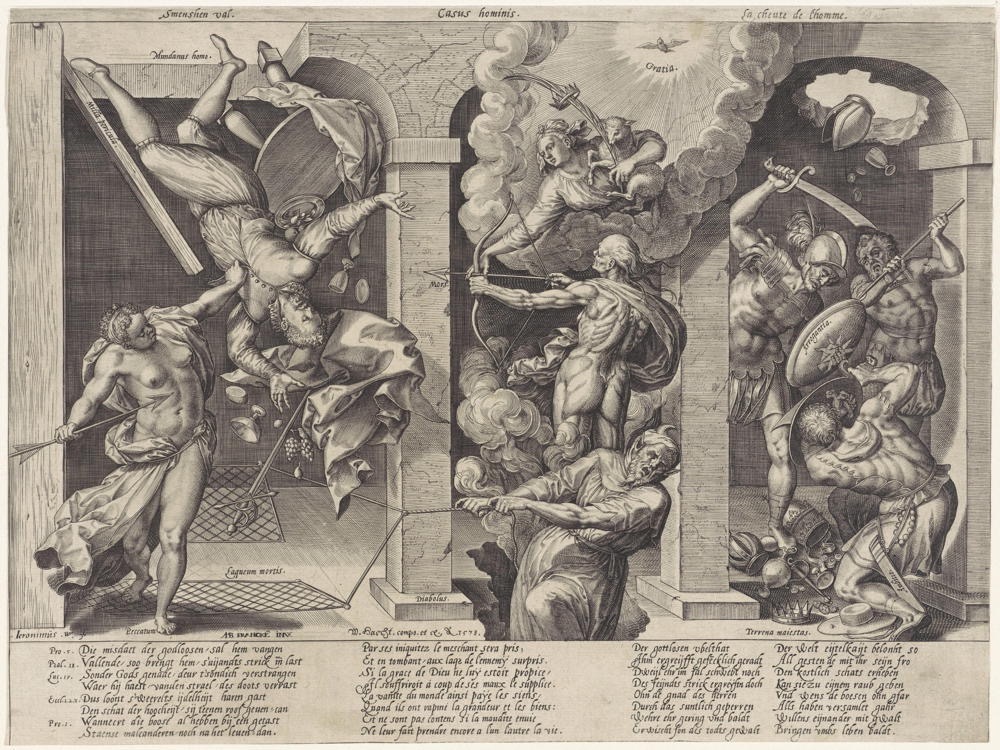Arrogance

Hieronymus Wierix: Val van de mens [The Fall of Man] (1578)
Allegorie op de ondergang van de mens. De Wereldse Mens (Mundanus Homo) valt met tafel en al door het geopende luik in de vloer. De duivel (Diabolus) houdt zijn netten gereed om hem te vangen. Een naakte vrouw, de Zonde (Peccatum), trekt de Wereldse Mens aan zijn jas, zodat ze hem met haar pijl kan doorboren. In het midden richt de Dood (Mors) zijn pijl op de vallende man. Hij wordt tegengehouden door de Goddelijke Genade (Gratia). Boven haar hoofd de duif van de Heilige Geest. Geheel rechts vechten Arrogantie (Arrogantia), de man met helm, schild en opgeheven zwaard, Eerzucht (Ambitio) en Geweld (Violentia). Ze strijden om de aardse rijkdommen die van het bed van Vanitas door het gat in de vloer zijn gevallen. De voorstelling wordt verduidelijkt in de Nederlandse, Franse en Duitse onderschriften in de marge.
Allegory of man's demise. The Worldly Man (Mundanus Homo) falls into the floor with the table and all through the open hatch. The devil (Diabolus) keeps his nets ready to catch him. A, Sin (Peccatum), pulls the Worldly Man by his coat so that she can pierce him with her arrow. In the middle, Death (Mors) points his arrow at the falling man. He is held back by the Divine Grace (Gratia). Above her head, the dove of the Holy Ghost. On the far right, fight Arrogance (Arrogantia), the man with helmet, shield, and raised sword, Ambition (Ambitio), and Violence (Violentia). They compete for the earthly riches that have fallen from Vanitas' bed through the hole in the floor. The performance is clarified in the Dutch, French, and German captions on the margins.
—
" … an infantile worldview and a wound that could never heal."
The Exiled exhibit a common Arrogance. The act of being Exiled feels undeserved. Consequently, the Exiled feel wronged. They believe themselves to be, as a class, innocent parties. Nothing better fuels an Arrogance than having been unjustly punished. The Exiled feel almost saintly superior in their anguish. Many carry a martyr complex. The world they've been cruelly forced into feels far beneath their station. Having been coerced into abandoning the center of their universe, they recognize how everything in the Exiled-Into hinterlands stands well beneath their standards. Forced to live among the rabble, the Exile might seem withdrawn. They are probably not as shy as they first appear. They are seething and have no idea what rules govern their presence there. They feel embarrassed.
Washington, DC, might seem like a shining city surrounding Capitol Hill until you search for an apartment on the backside of that shining hill. Over there, row houses built before the Civil War stand elbow to shoulder, much worse for the wear. Even the tonier neighborhoods carry the tool marks of a shockingly different culture that prizes what nobody back home ever once aspired to acquire. The Exiled easily interpret as Arrogance, whatever they sense as stand-offishness from the natives. They do this without the irony that should accompany anybody neglecting to notice that they're exhibiting precisely the same behaviors they rail against. They seem brittle, effete, and obviously incomplete.
The Exiled become a work-in-process after already achieving success in a previous, parallel life. The last thing The Exiled expected before they were crudely Exiled was that they might be forced to start that working-in-process over, to learn that their finished product wouldn't sustain them and that they'd have to start counting essentially all over again from zero. The very thought exhausts them and, curiously, encourages that abiding Arrogance. To them, before times will eternally be the good old taken away antebellum days. They begrudge the force that sorted them out so near the bottom again. They'd crawled up out of there once before but feel deeply uncertain whether they have a repeat performance left in them. They resist out of Arrogance, out of the unholy injustice of their situation.
The Arrogance is their valiant defense, their resistance, their insistence that they do not deserve the cards dealt to them this time. It's a homage to their former station and evidence of a certain courage thus far lacking. You would probably be prickly, too, imagining everyone surrounding beneath you and therefore undeserving of the success denied you, who was eminently more deserving. You explain that mere fortune, just chance, distinguishes one from another, that had they had the same breaks, they might have broken worse and probably would have. You're jealous. You're wounded, seemingly terminally disadvantaged. These traits might fade away over time. Until then, you will very likely be an intolerably intolerant neighbor, critical to a fault as if none of what befell you could have possibly been your fault.
Recovery comes after alienating many would-have-been allies. Metasticized, I could have become a MAGA-quality victim and succumbed to poisonous cynicism. I couldn't quite successfully convince myself that I was that powerless. Yes, I began the long, slow crawl out of my own oblivion. I discovered that not only did I have another upward crawl left in me, but I rather enjoyed the challenge. I had to ditch the son-of-a-bitch who crawled up out of my cellar to haunt my earliest Exile. After The Fall Of Man comes the recovery of man again, again and again, however many recoveries that man might require. One can always retire if ready to settle for an infantile worldview and a wound that could never heal.
©2024 by David A. Schmaltz - all rights reserved


